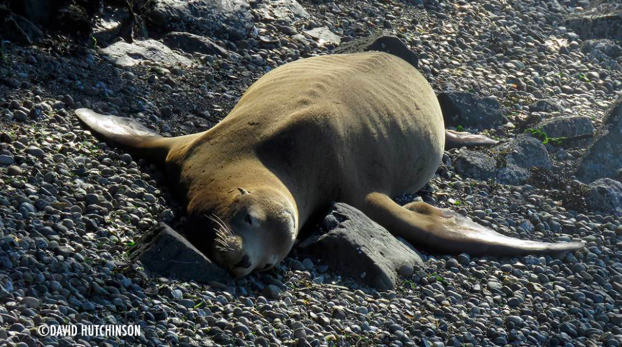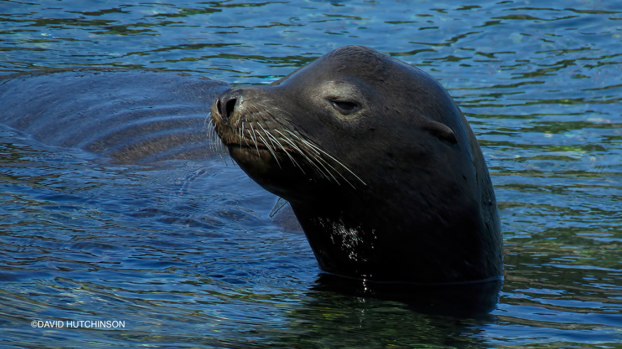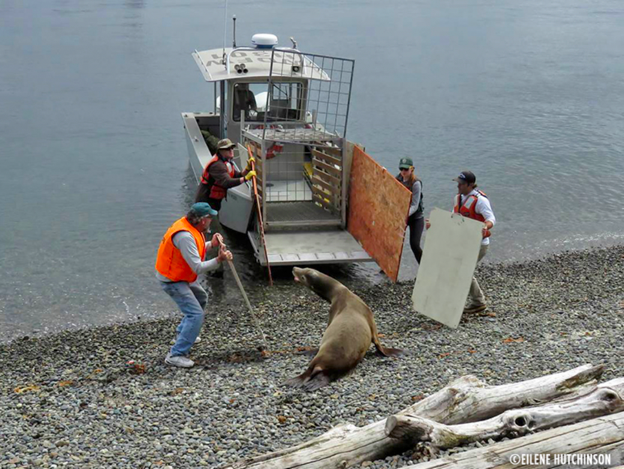Dudley
SSMMSN protects and aids in capture of sea lion
Jul/18/18 06:04 PM
 SEAL SITTERS VOLUNTEERS PROTECT AILING SEA LION
SEAL SITTERS VOLUNTEERS PROTECT AILING SEA LIONOn Friday the 13th, First Responders David & Eilene followed up on a hotline call and discovered a male California sea lion at Cove 1, the small beach just north of Salty's Restaurant. They noticed the animal was not using his rear flippers and moved with difficulty. His upper body was thin. He had not made the normal spring migration south, possibly due to these issues.
Seal Sitters sent photos to Dyanna Lambourn of WDFW Marine Mammal Investigations, who noted his distended abdomen and suggested the sea lion, nicknamed Dudley, was likely suffering from a fatal cancer. Casey MacLean, Seal Sitters volunteer and SR3 veterinary nurse, arrived to make a visual assessment.
Dudley swam away, but reappeared at a small cove inside Jack Block Park, now obviously terribly thin (photo above). Over the next four days under the watchful eyes of Seal Sitters volunteers, the sea lion spent his time drifting in the waters close to shore and hauling out at different beaches. Steve Jeffries and Coral Pasi of WDFW came to observe and advise on Monday. It was agreed the best outcome for Dudley was a peaceful and natural death, so Seal Sitters pledged to monitor and protect him while realizing that process could take days.
 SEA LION CAPTURED AND TRANSPORTED FOR EVALUATION AND EUTHANASIA
SEA LION CAPTURED AND TRANSPORTED FOR EVALUATION AND EUTHANASIABy Tuesday, Dudley's increased penchant for hauling out at Cove 3, by the public fishing pier, began to pose a danger to himself and the kayakers, paddle boarders and visitors who used the popular the public beach. Seal Sitters called Steve Jeffries and plans for capture and removal were swiftly put into place. On Wednesday morning Dudley appeared at Cove 3 and settled in by the logs.
As Seal Sitters volunteers maintained the perimeter and talked to a crowd of onlookers who gathered at the railing, Steve and his crew including Jeff Harris of NOAA arrived with crowder boards, large cage and a boat with a drop-down ramp similar to a pickup truck tailgate. They made a successful capture, retrieved the boat at Don Armeni, and drove Dudley to the WDFW lab.
After an exam revealed the animal had severe health conditions he could not survive. he was humanely euthanized. A necropsy was performed the next day. While his condition is suspect for urogenital cancer, the exact cause of death won’t be known until the samples are analyzed. Seal Sitters will share information from the exam as it becomes available.
 THANK YOU TO EVERYONE INVOLVED
THANK YOU TO EVERYONE INVOLVEDAlthough we are saddened that Dudley could not survive, we take satisfaction from knowing he was safe from harassment in his last days. We appreciate Greg and his staff at Alki Kayak Rental, who safely stowed some supplies needed for the capture and treated a persistent Dudley with patience and good humor. Many thanks also to our stranding network partner WDFW Marine Mammal Investigations, to NOAA and to SR3.
And finally, thanks to the many Seal Sitters volunteers who spent long hours watching, tracking and protecting this wonderful animal.
HISTOLOGIC REPORT
Histologic findings have corroborated the clinical observations and gross necropsy findings. This animal had a disseminated urogenital carcinoma. Sadly, urogenital carcinoma is common in wild California sea lions along the west coast of the U.S.







